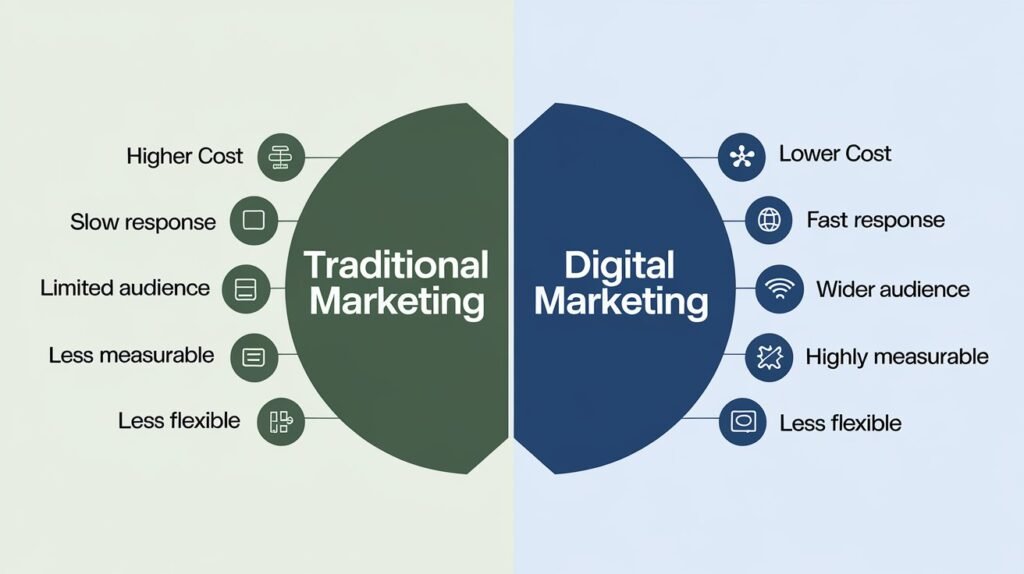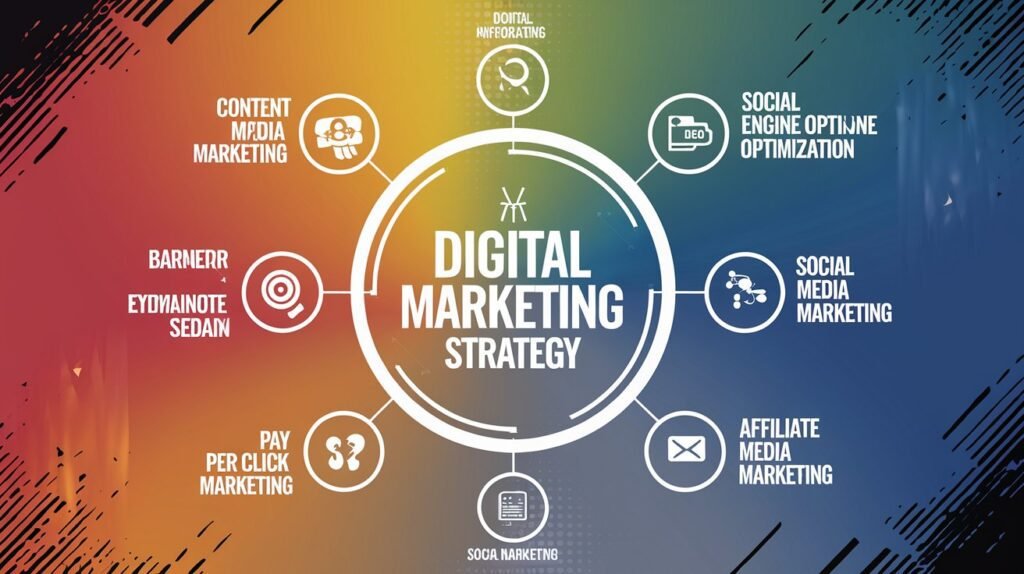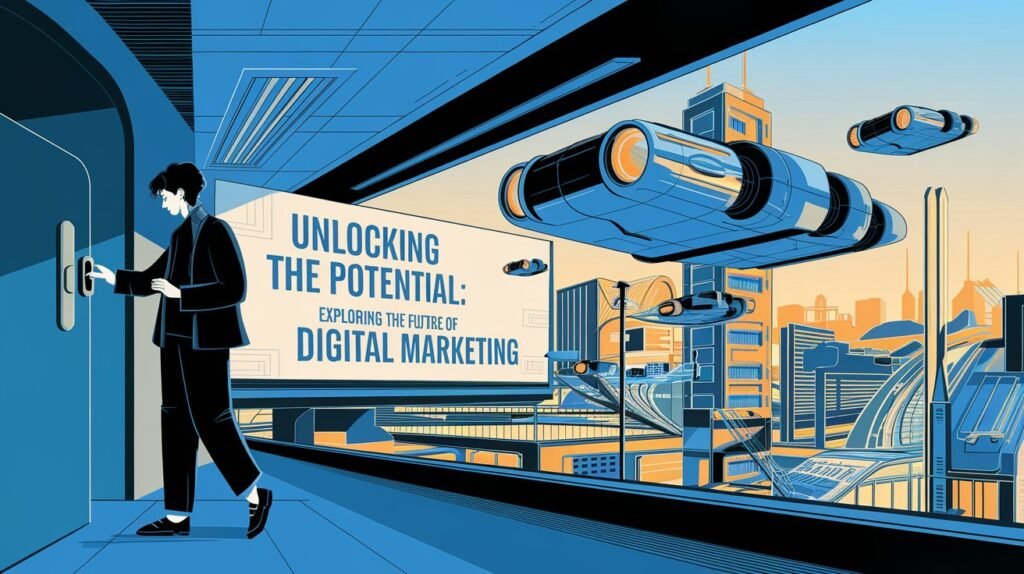
What is Digital Marketing?
- Sunil Rathour (Digital Marketing Expert)
Digital marketing is all about promoting products or services using online platforms and technologies. It includes things like advertising on social media, sending emails to customers, making sure your website shows up when people search on Google, and more. Basically, it’s any way you can use the internet to tell people about your business.
Understanding Digital Marketing
At its core, digital marketing involves using various online platforms and tools to engage with potential customers, build brand awareness, and ultimately drive conversions. This approach encompasses a wide range of tactics, from SEO company in Ashiyana and content marketing to social media advertising and email campaigns.
Evolution of Digital Marketing
Digital marketing agencies in Lucknow have evolved dramatically over the years, spurred by advancements in technology and changes in consumer behavior. What started as simple banner ads and email blasts has transformed into a sophisticated ecosystem of data-driven strategies and personalized experiences. Today, businesses have access to a wealth of digital tools and platforms that allow them to target specific audiences, measure campaign performance, and optimize their marketing efforts in real-time.
Difference between Traditional and Digital Marketing ?
Now, let’s talk about the difference between traditional marketing and digital marketing.
Key Differences

Traditional Marketing
Audience Reach: Traditional marketing methods, such as TV commercials, billboards, or print ads, typically reach a broad and often undefined audience. There is little to no control over who exactly sees the ads.
Cost: Traditional marketing can be expensive, often requiring large budgets for TV ads, newspaper ads, or printing flyers. The cost is generally higher due to the broader reach and the nature of the medium.
Measuring Effectiveness: It’s more challenging to measure the effectiveness of traditional marketing campaigns. Metrics are often vague, relying on estimates rather than precise data.
Interaction: Traditional marketing is a one-way communication channel. Brands send out messages to consumers, but there is little opportunity for immediate feedback or interaction.
Flexibility: Making changes to a traditional marketing campaign is time-consuming and costly. Adjustments often require significant lead time and resources, making it less flexible.
Digital Marketing
- Audience Reach: Digital marketing allows for precise targeting, reaching specific demographics based on age, interests, online behavior, and more. This ensures that ads are shown to a more relevant audience.
- Cost: Digital marketing is generally more cost-effective. Businesses only pay for actual interactions, such as clicks or website visits, making it more budget-friendly and scalable.
- Measuring Effectiveness: Digital marketing provides detailed analytics and data, allowing businesses to track metrics like click-through rates, conversions, and sales. This real-time data helps in evaluating the success of campaigns.
- Interaction: Digital marketing fosters two-way communication. Consumers can interact with ads through comments, shares, or direct engagement, creating opportunities for real-time feedback and relationships.
- Flexibility: Digital marketing campaigns are highly flexible, allowing for quick adjustments. Changes can be made in real-time based on performance data, making it easier to adapt and optimize strategies.
Key Components (Types) of Digital Marketing
Digital marketing agency in Aliganj, Lucknow encompasses a variety of components that work together to create effective online campaigns. Let’s delve deeper into each of these key components:

Search Engine Optimization (SEO): SEO company in Ashiyana involves optimizing your website to improve its visibility in search engine results. This includes keyword research, creating high-quality content, optimizing website structure, and building backlinks. SEO helps drive organic traffic to your website and improves its ranking on search engine results pages (SERPs).
Content Marketing: Content marketing focuses on creating and distributing valuable, relevant content to attract and engage your target audience. This content can take various forms, such as blog posts, articles, videos, infographics, and eBooks. The goal is to provide informative and entertaining content that resonates with your audience and builds brand authority.
Social Media Marketing: Social media marketing involves using social media platforms like Facebook, Instagram, Twitter, LinkedIn, and Pinterest to connect with your audience, build brand awareness, and drive traffic to your website. It includes activities such as posting content, running ads, engaging with followers, and analyzing performance metrics.
Email Marketing: Email marketing involves sending targeted, personalized emails to your subscribers to nurture leads, promote products or services, and build customer relationships. It includes creating email campaigns, segmenting your email list, designing visually appealing emails, and analyzing email performance.
Pay-Per-Click (PPC) Advertising: PPC advertising allows you to display ads on search engines and other platforms and pay a fee each time someone clicks on your ad. Platforms like Google Ads and social media advertising platforms offer PPC advertising options, allowing you to target specific keywords, demographics, and interests to reach your audience.
Influencer Marketing: Influencer marketing involves partnering with influencers—individuals with a significant following and influence on social media—to promote your products or services. Influencers create content featuring your brand and share it with their audience, helping you reach new customers and build credibility.
Analytics and Data Analysis: Analytics and data analysis play a crucial role in digital marketing, allowing you to measure the performance of your campaigns, track key metrics, and make data-driven decisions. Tools like Google Analytics provide valuable insights into website traffic, user behavior, and conversion rates, helping you optimize your marketing efforts for better results.
Marketing Automation: Marketing automation involves using software and technology to automate repetitive marketing tasks, such as email scheduling, social media posting, lead nurturing, and campaign tracking. Automation streamlines workflows, saves time, and ensures consistent messaging across channels, enhancing efficiency and productivity.
Crafting an Effective Digital Marketing Strategy
In the ever-evolving landscape of digital marketing company in Lucknow, having a well-thought-out strategy is paramount to success. Let’s delve deeper into the essential
Components of a robust digital marketing strategy:

Define Clear Objectives: Begin by establishing specific, measurable goals. Whether it’s increasing website traffic, boosting sales, or enhancing brand visibility, clarity in objectives is crucial.
Know Your Audience Inside Out: Dive deep into understanding your target audience. Analyze demographics, preferences, behavior patterns, and pain points to tailor your marketing efforts effectively.
Select the Right Channels: With a myriad of digital platforms available, it’s vital to choose the ones that resonate most with your audience. From social media platforms like Facebook, Instagram, and LinkedIn to search engines like Google, each channel offers unique opportunities for engagement.
Create Compelling Content: Content lies at the heart of digital marketing agency Lucknow. Develop high-quality, relevant content that educates, entertains, or inspires your audience. Whether it’s blog posts, videos, infographics, or podcasts, ensure your content adds value to the user experience.
Optimize for Search Engines (SEO): Enhance your online visibility by optimizing your website and content for search engines. Conduct keyword research, optimize meta tags, improve site speed, and focus on creating valuable, shareable content to boost your search engine rankings.
Engage on Social Media: Social media platforms offer unparalleled opportunities for interaction and engagement with your audience. Leverage these channels to build relationships, share content, run targeted ad campaigns, and gather valuable feedback from your customers.
Harness the Power of Email Marketing: Despite being one of the oldest forms of digital marketing services in Ashiyana, email remains a highly effective tool for nurturing leads and driving conversions. Develop personalized, engaging email campaigns that deliver relevant content and drive action.
Measure and Analyze Results: Utilize analytics tools such as Google Analytics, Facebook Insights, or HubSpot to track the performance of your digital marketing efforts. Monitor key metrics like website traffic, engagement rates, conversion rates, and ROI to gauge the effectiveness of your strategies.
Continuous Improvement: Digital marketing is an iterative process. Continuously monitor performance, gather insights, and adapt your strategies accordingly. Experiment with new tactics, stay updated on industry trends, and strive for continuous improvement to stay ahead of the curve.
Unlocking the Potential: Exploring the Future of Digital Marketing
As technology continues to advance at a rapid pace, the future of digital marketing agency in Lucknow holds immense promise and potential. Let’s take a closer look at some key trends and developments shaping the landscape of digital marketing:

Artificial Intelligence (AI) and Machine Learning: AI and machine learning algorithms are revolutionizing digital marketing by enabling more personalized and predictive experiences for consumers. From chatbots and virtual assistants to advanced data analytics and predictive modeling, AI-powered tools are enhancing targeting, personalization, and automation in marketing campaigns.
Voice Search Optimization: With the rise of voice-enabled devices like smart speakers and virtual assistants, optimizing content for voice search is becoming increasingly important. Marketers need to adapt their SEO strategies to accommodate natural language queries and conversational search patterns, ensuring their content remains discoverable in voice search results.
Augmented Reality (AR) and Virtual Reality (VR): AR and VR technologies are transforming the way consumers engage with brands and products. Marketers can leverage AR and VR experiences to create immersive and interactive campaigns that captivate audiences and drive engagement. Whether it’s virtual product demos, immersive brand experiences, or gamified marketing campaigns, the possibilities are endless.
Hyper-Personalization: As consumers demand more personalized and relevant experiences, hyper-personalization is emerging as a key strategy for marketers. By leveraging data analytics, AI, and machine learning, marketers can deliver highly targeted and customized content, offers, and recommendations tailored to individual preferences and behavior.
Content Marketing Evolution: Content marketing continues to evolve with the rise of new formats and platforms. Video content, live streaming, interactive content, and user-generated content are gaining traction as consumers seek more engaging and authentic experiences. Marketers need to adapt their content strategies to incorporate these emerging formats and channels effectively.
Privacy and Data Protection: With growing concerns around data privacy and security, regulations like the General Data Protection Regulation (GDPR) and the California Consumer Privacy Act (CCPA) are reshaping the digital marketing landscape. Marketers need to prioritize transparency, consent, and data protection to build trust with consumers and comply with regulatory requirements.
Ephemeral Content and Social Messaging: Ephemeral content, such as stories on platforms like Instagram, Snapchat, and Facebook, is gaining popularity among consumers due to its authenticity and temporary nature. Marketers can leverage ephemeral content to deliver real-time updates, behind-the-scenes glimpses, and exclusive offers, fostering a sense of urgency and FOMO (fear of missing out) among audiences.
Influencer Marketing Evolution: Influencer marketing is evolving beyond traditional social media influencers to include micro-influencers, nano-influencers, and even virtual influencers. Marketers are leveraging these diverse influencer types to reach niche audiences, build authentic connections, and drive engagement in more meaningful ways.
Need Best Digital Marketing Services in Lucknow Contact Ad Sangam
Related Posts

